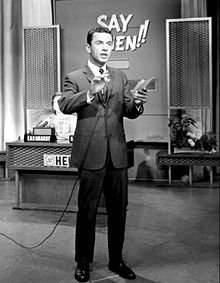
A game show is a genre of broadcast viewing entertainment where contestants compete in a game for rewards. The shows are typically directed by a host, who explains the rules of the program as well as commentating and narrating where necessary. The history of the game shows dates back to the late 1930s when both radio and television game shows were broadcast. The genre became popular in the United States in the 1950s, becoming a regular feature of daytime television.

Hollywood Squares is an American game show in which two contestants compete in a game of tic-tac-toe to win cash and prizes. The show piloted on NBC in 1965 and the regular series debuted in 1966 on the same network. The board for the game is a 3 × 3 vertical stack of open-faced cubes, each occupied by a celebrity seated at a desk and facing the contestants. The stars are asked questions by the host and the contestants judge the truth of their answers to gain squares in the right pattern to win the game.

Match Game is an American television panel game show that premiered on NBC in 1962 and has been revived several times over the course of the last six decades. The game features contestants trying to match answers given by celebrity panelists to fill-in-the-blank questions. Beginning with the CBS run of the 1970s, the questions are often formed as humorous double entendres.
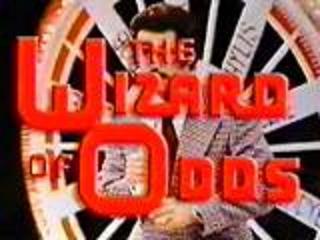
The Wizard of Odds is an American television game show hosted by Alex Trebek that aired on NBC from July 16, 1973, to June 28, 1974, in which people from the studio audience vied in a number of rounds, primarily games revolving around statistical questions. John Harlan announced the pilot; Los Angeles radio personality Sam Riddle was the show's first announcer; towards the end of the run, Charlie O'Donnell replaced him. The title was a parody of the classic 1939 movie The Wizard of Oz and was the first American game show Trebek hosted.
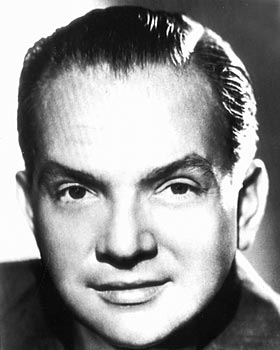
Mark Leo Goodson was an American television producer who specialized in game shows, most frequently with his business partner Bill Todman, with whom he created Goodson-Todman Productions.
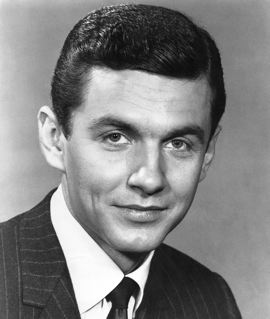
Art James was an American game-show host, best known for shows such as The Who, What, or Where Game, It's Academic. and Pay Cards! He was also the announcer and substitute host on the game show Concentration.
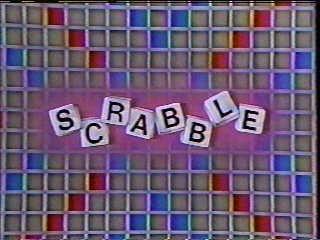
Scrabble is an American television game show based upon the board game Scrabble. Contestants competed in a series of rounds to fill in words within a crossword puzzle for cash. Muriel Green of Exposure Unlimited developed the idea for a television game show based upon the board game concept. During 1983, Green convinced Selchow and Righter, who at that time owned the Scrabble board game, to license Exposure Unlimited to produce the game show. Exposure Unlimited co-produced the show with Reg Grundy Productions, and licensed the show to NBC. Scrabble aired on NBC from July 2, 1984, to March 23, 1990, and again from January 18 to June 11, 1993. Chuck Woolery hosted the program. Jay Stewart was the announcer for the first year. Charlie Tuna replaced him in mid-1985 and remained through the original run and the entirety of the 1993 revival.

Password is an American television game show. Two teams, each composed of a celebrity and contestant, attempt to convey mystery words to each other using only single-word clues, in order to win cash prizes.

Truth or Consequences was an American game show originally hosted on NBC radio by Ralph Edwards (1940–57) and later on television by Edwards (1950–54), Jack Bailey (1954–56), Bob Barker (1956–75), Steve Dunne (1957–58), Bob Hilton (1977–78) and Larry Anderson (1987–88). The television show ran on CBS, NBC and also in syndication. The premise of the show was to mix the original quiz element of game shows with wacky stunts.
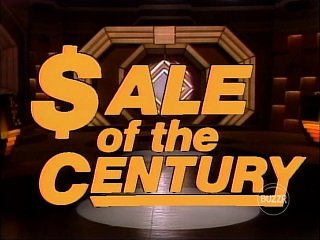
Sale of the Century is an American television game show that originally debuted on September 29, 1969, on NBC daytime. It was one of three NBC game shows to premiere on that date, the other two being the short-lived game shows Letters to Laugh-In and Name Droppers. The series aired until July 13, 1973, and a weekly syndicated series began that fall and ran for one season.
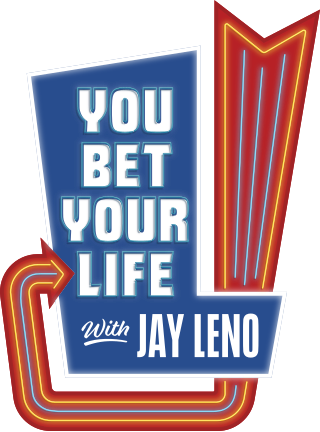
You Bet Your Life is an American comedy quiz series that has aired on both radio and television. The original version was hosted by Groucho Marx of the Marx Brothers, with announcer and sidekick George Fenneman. The show debuted on ABC Radio on October 27, 1947, moved to CBS Radio debuting October 5, 1949, and went to NBC-TV and NBC Radio on October 4, 1950. Because of its simple format, it was possible to broadcast the show on both radio and television but not simultaneously. Many of the laughs on the television show were evoked by Groucho's facial reactions and other visual gimmicks. So the two versions were slightly different. The last episode in a radio format aired on June 10, 1960. The series continued on television for another year, recording the last season, beginning on September 22, 1960, with a new title, The Groucho Show.

Peter Pan is an American brand of peanut butter that is marketed by Post Consumer Brands, part of Post Holdings. Named after the J. M. Barrie character, the product was introduced by Swift & Company through its Derby Foods subsidiary, E.K. Pond Company. It was renamed "Peter Pan" in 1928. Introduced in 1988, the product sold in The United States.

The Magnificent Marble Machine is an American television game show. Contestants partnered with celebrities to answer trivia questions and gain control of an oversized pinball machine. The program premiered on NBC on July 7, 1975 at 12:00 pm ET, replacing the short-lived game show Blank Check.

High Rollers is an American television game show created by Merrill Heatter. Two contestants compete to answer trivia questions and gain control of an oversized set of dice, which they then roll to eliminate the numbers 1 through 9 from a game board in order to win cash and prizes. It is an adaptation of the standard dice game shut the box.

Dream House is an American game show that saw contestants competing to win, as the title of the show indicates, a new house. The show originally premiered in primetime on ABC on March 27, 1968, with a daytime edition premiering on April 1, 1968. The primetime series aired weekly until September 19, 1968, and the daytime series aired daily until January 2, 1970, when it was replaced with All My Children. The daytime series was revived for NBC's daytime schedule and premiered on April 4, 1983, running until June 29, 1984.
Three on a Match is an American television game show created by Bob Stewart that ran on NBC from August 2, 1971 to June 28, 1974 on its daytime schedule. The host was Bill Cullen and Don Pardo served as announcer on most episodes, with Bob Clayton and NBC staffers Wayne Howell and Roger Tuttle substituting at times.
Blank Check is an American game show that aired on NBC from January 6 to July 4, 1975. It was promoted as "television's first ESP game". Art James was the host, with Johnny Jacobs as the announcer.

The Price Is Right is an American game show produced by Mark Goodson-Bill Todman Productions, wherein contestants placed successive bids on merchandise prizes with the goal of bidding closest to each prize's actual retail price without surpassing it. The show was a precursor to the current and best-known version of the program, which premiered in 1972 on CBS's daytime schedule. It makes The Price Is Right one of only a few game show franchises to have aired in some form across all three of the Big Three television networks.
Letters to Laugh-In is a daytime game show and spin-off of NBC's nighttime comedy series, Rowan & Martin's Laugh-In, that aired on the network from September 29 to December 26, 1969. The show was hosted by Gary Owens, the announcer for Laugh-In.

Jar with a Twist design concept for a peanut butter jar with a rotating bottom that functions similar to a deodorant stick by raising its contents towards the top of the container. The concept was designed as a school design project, and it was never mass produced or sold on the market.
